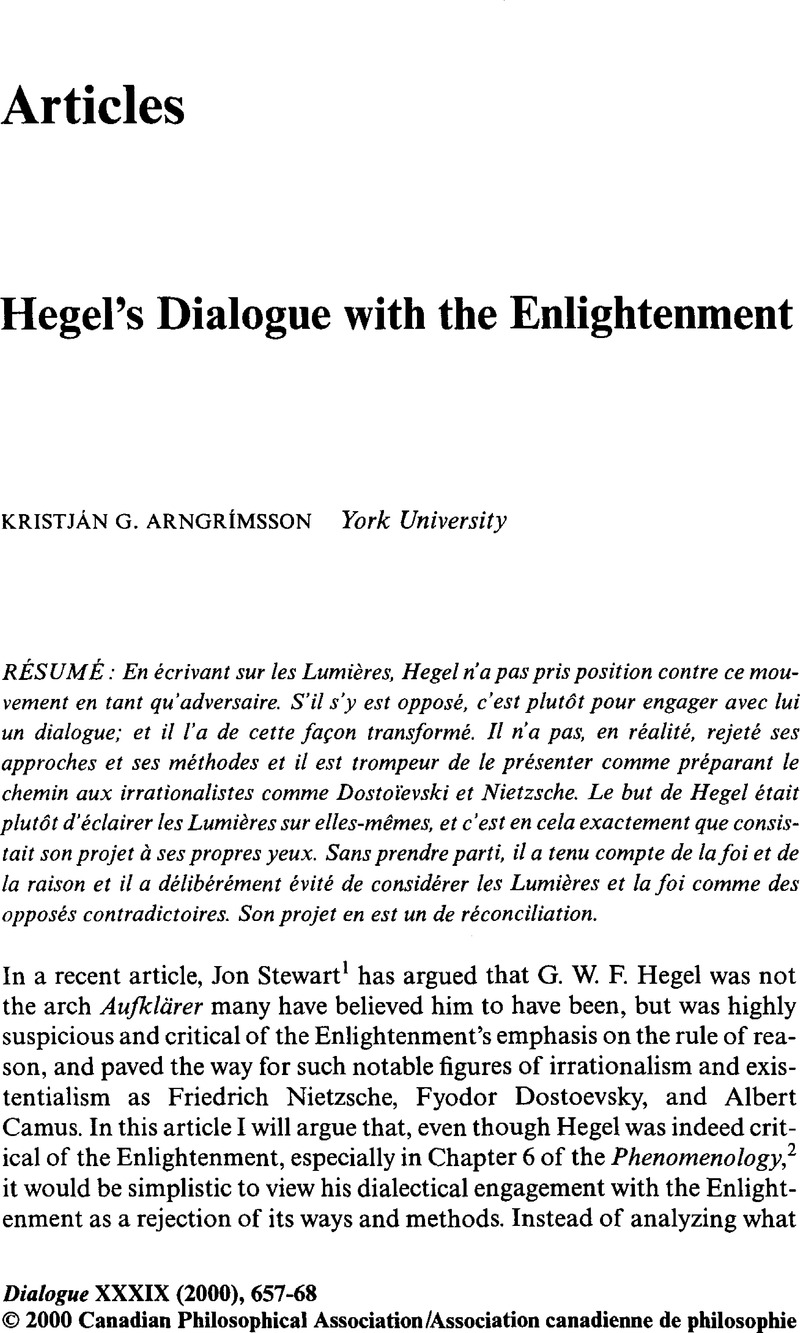No CrossRef data available.
Published online by Cambridge University Press: 13 April 2010

1 Stewart, Jon, “Hegel and the Myth of Reason,” The Owl of Minerva, 26, 2 (Spring 1995): 187–200.CrossRefGoogle Scholar
2 Hegel, G. W. F., Hegel's Phenomenology of Spirit, translated by Miller, A. V. (Oxford: Oxford University Press, 1977).Google Scholar
3 Gadamer, Hans-Georg, “On the Scope and Function of Hermeneutical Reflection,” translated by Hess, G. B. and Palmer, R. E., in Philosophical Hermeneutics, edited by Linge, David E. (Berkeley: University of California Press, 1976), p. 33. The quotation is from Jürgen Habermas.Google Scholar
4 Stewart, “Hegel and the Myth of Reason,” p. 194.
5 Hegel, Hegel's Phenomenology of Spirit, p. 332.
6 Lauer, Quentin, S.J., A Reading of Hegel's Phenomenology of Spirit (New York: Fordham University Press, 1993), p. 231.Google Scholar
7 Giovanni, George Di, “Hegel's Phenomenology and the Critique of the Enlightenment: An Essay in Interpretation,” Laval théologique et philosophique, 51, 2 (juin 1995): 251–70; see p. 270.CrossRefGoogle Scholar
8 Hegel, Hegel's Phenomenology of Spirit, p. 331.
9 Stewart, “Hegel and the Myth of Reason,” p. 196.
10 Dostoevsky, Fyodor, Notes from Underground, translated by Ginsburg, Mirra (New York: Bantam Books, 1992), pp. 5, 9.Google Scholar
11 Stewart, “Hegel and the Myth of Reason,” p. 196.
12 Ibid., p. 198. This interpretation of Camus's novel is, however, contentious. Tarrou is not the main character of the novel, and is not convincing as the author's voice. That part belongs to Dr. Rieux, who seems to have a very different view of the plague in Oran. His view is that of a man who does not want simply to live with the infection, but fight it: “if you refuse to be beaten [by the plague], you have some pleasant surprises,” he says (Camus, Albert, The Plague, translated by Gilbert, Stuart [New York: Alfred A. Knopf, 1974], p. 144).Google Scholar
13 Cf. Rorty, Richard, Contingency, Irony, and Solidarity (Cambridge: Cambridge University Press, 1989).CrossRefGoogle Scholar
14 Ibid., p. 46.
15 Ibid., pp. 93–94.
16 Guignon, Charles B., “Pragmatism or Hermeneutics? Epistemology after Foundationalism,” in The Interpretive Turn: Philosophy, Science, Culture, edited by Hiley, D., Bohman, J., and Shusterman, R. (Ithaca and London: Cornell University Press, 1991), p. 96.Google Scholar
17 Stewart, “Hegel and the Myth of Reason,” p. 196.
18 Dostoevsky's underground man saw this: “I'll wager that you think I'm writing all this merely out of bravado, and bravado in bad taste at that, clattering my sword like that officer, just to exercise my wit at the expense of men of action. But, my dear sirs, who would take pride in his own diseases, and brag about them too?
“Ah, what am I saying? Everybody does it. It's precisely their diseases that people pride themselves on, and I do too—more perhaps than anybody else” (Dostoevsky, Notes from Underground, pp. 5–6).
19 Cf. Kundera, Milan, The Unbearable Lightness of Being, translated by Heim, Michael Henry (New York: HarperCollins Publishers, 1984), p. 250Google Scholar: “When the heart speaks, the mind finds it indecent to object. In the realm of kitsch, the dictatorship of the heart reigns supreme.”
20 Dupré, Louis, “Hegel and the Enlightenment: A Study in Ambiguity,” The Owl of Minerva, 28, 1 (Fall 1996): 13–24; seep. 13.CrossRefGoogle Scholar
21 Harris, H. S., Hegel's Ladder, Vol. 2: The Odyssey of Spirit (Indianapolis/Cambridge: Hackett Publishing, 1997), p. 335.Google Scholar
22 Ibid., p. 343.
23 Hegel, Hegel's Phenomenology of Spirit, p. 332.
24 Lauer, S.J., A Reading of Hegel's Phenomenology of Spirit, p. 231.
25 Ibid., p. 234.
26 Ibid., p. 236.
27 Hegel, Hegel's Phenomenology of Spirit, p. 353.
28 The notion of a “doubled world” comes from Harris.
29 I would like to thank Dr. Howard Adelman and Dr. David A. Jopling, both at York University, for their criticism and comments on earlier drafts of this article.